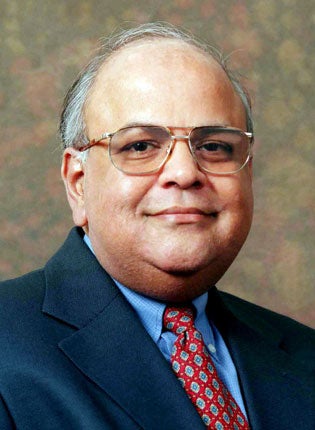Zuma's first cabinet fails to include veteran finance chief
New face in charge of economy as South Africa heads into recession

Your support helps us to tell the story
From reproductive rights to climate change to Big Tech, The Independent is on the ground when the story is developing. Whether it's investigating the financials of Elon Musk's pro-Trump PAC or producing our latest documentary, 'The A Word', which shines a light on the American women fighting for reproductive rights, we know how important it is to parse out the facts from the messaging.
At such a critical moment in US history, we need reporters on the ground. Your donation allows us to keep sending journalists to speak to both sides of the story.
The Independent is trusted by Americans across the entire political spectrum. And unlike many other quality news outlets, we choose not to lock Americans out of our reporting and analysis with paywalls. We believe quality journalism should be available to everyone, paid for by those who can afford it.
Your support makes all the difference.South Africa's veteran finance minister Trevor Manuel was replaced in a government shake-up yesterday but appointed to head a powerful new planning body, keeping him at the heart of policy-making in President Jacob Zuma's first cabinet. A day after taking office, Mr Zuma named the tax authority chief Pravin Gordhan to replace Mr Manuel in another sign of continuity as Africa's biggest economy heads towards its first recession in 17 years.
Mr Manuel had been in the job for 13 years, making him the world's longest-serving finance minister. Investors approved of the tight monetary and fiscal policies he kept in place.
"Comrade Trevor Manuel has been given a new structure, a very powerful structure that is going to work out a national plan of government," Mr Zuma said while expecting a positive market reaction to the appointment.
As well coping with the fallout from the global financial crisis, Mr Zuma also faces pressure to deliver on 15 years of promises by his ruling African National Congress (ANC) to tackle widespread poverty, crime and Aids, and create jobs. The ANC won an election landslide on 22 April, keeping the dominance it has held since the end of apartheid in 1994.
His toughest task may be balancing the interests of unions and Communists who helped him rise to the top against those of investors who fear he will steer the economy to the left.
Some of the more vocal left-wingers found places in the cabinet, but not holding key economic portfolios. The South African Communist Party's general-secretary, Blade Nzimande, was named Minister of Higher Education and Training. "He certainly put his own staff on the cabinet which I think is a good thing," said Nel Marais, of Executive Research Associates. "There are quite a few strong new faces in the cabinet that played a significant role in Zuma's political fight for survival in the past few months."
Mr Zuma also reached out to Afrikaners, many of whom feel excluded 15 years after the end of white minority rule. He appointed the Deputy Agriculture Minister from the Freedom Front, which explicitly aims to protect Afrikaner interests.
A top businessman Tokyo Sexwale, who returned to politics two years ago, became Minister of Human Settlements. But Mr Zuma left out Winnie Madikizela-Mandela, who is back in parliament after a fraud conviction. The former wife of Nelson Mandela had been tipped for a cabinet post despite being seen by many as a divisive figure.
Mr Zuma named his predecessor, Kgalema Motlanthe, as his deputy. He had served in a caretaker role since the former president, Thabo Mbeki, was forced from office last September by the ANC.
Although markets were expected to welcome the key economic appointments, some analysts questioned how effectively Mr Manuel's new planning commission and another new economic ministry would work with the trade and finance ministries. "All those, plus deputies, will be fighting for the same bowl. Co-ordination from that point of view is going to be hugely problematic" said Mr Marais.
Join our commenting forum
Join thought-provoking conversations, follow other Independent readers and see their replies
Comments